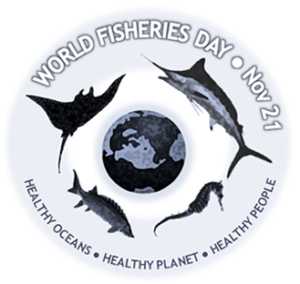Celebrate World Fisheries Day (or Week) – and protect seabirds

Supporting sustainable fisheries
Globally, many species depend on healthy oceans and fish populations, including top predators such as marine mammals and many seabirds. For endangered California Least Terns, declines in the local populations of some key prey fish, such as Northern Anchovy, now cause annual mortality and poor growth of chicks, further hampering recovery. The issues that affect fish populations are complex, but include historic and on-going over-exploitation, sometimes resulting from our lack of knowledge about current population trends or about the best adaptive management practices. Most recently, climate change may be creating unsuitable local conditions, leading to further declines and/or shifts in distributions of populations.
Improving our knowledge about the habitat needs of species during their full life cycle, their ecology, and about more complex processes that include time lags in population dynamics, is a foundation for establishing strategies to support healthy fisheries, and the species and communities that depend on them.
For evidence-based adaptive management, dialogue and knowledge exchange are crucial and require collaboration among all sectors – consumers, communities, groups engaged in commercial fisheries and recreational fishing, agencies, and biologists. Participate in efforts to gain knowledge to promote sustainable fisheries – your community, the fish (and the birds) will benefit, long-term!
Read about California Audubon’s recent blog about the Pacific Fisheries Management Meeting:
The Audubon network shows up for anchovy, a little fish with a big impact

The Pacific Fisheries Management Council (https://www.pcouncil.org/) offers helpful
